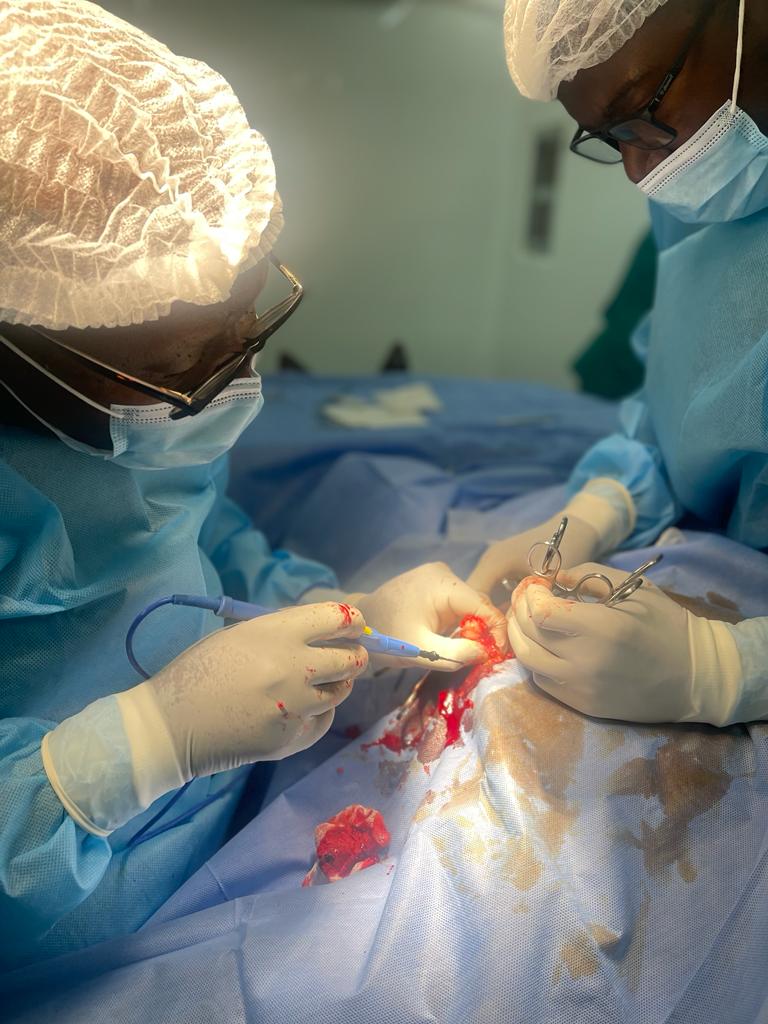In 2020, an audit by Senegal's Mother and Child Health Department revealed that out of 71 operating theaters, 30 were non-functional, with 17 sidelined due to a shortage of trained personnel.[1] This dire situation underscored a pivotal element of the "third delay" – the postponement in receiving sufficient care at health facilities, which contributes to preventable maternal and neonatal deaths.[2] In response, WHO and the Government of Senegal intervened to revive ten operating theatres across ten districts. This included Mecke theatre in Kebemer, which had been dormant for thirteen years. This initiative culminated in hundreds of life-saving surgeries, elevated assisted delivery rates to 94 percent, and increased caesarean section rates from 4.6 percent to 6 percent [3], a step towards the ideal 10 to 15 percent rate associated with reduced maternal and neonatal mortality.[4] Furthermore, medical evacuations saw a dramatic 90 percent reduction, with only select severe obstetric cases needing advanced technical support, such as intensive care, being transferred. This transformation has markedly improved care safety and quality, heightened patient satisfaction, and led to substantial cost savings.[5]
Key WHO Contributions
- Improved quality of care through revising the SDMPR guidelines and training modules and updating maternal and newborn quality standards in line with current scientific recommendations.
- Offering financial support for scholarships to train 11 doctors in essential surgical procedures for emergency obstetric care, including caesarean sections.
- Strategically placing these trained doctors across 10 health districts to ensure the availability of skilled personnel where most needed.
- Training 60 paramedics in pediatric emergency and child healthcare to build a strong healthcare workforce.
How did Senegal, with the support of WHO, achieve this?
Emergency Obstetric and Neonatal Care (EmONC) is a vital medical intervention, providing immediate and essential care to pregnant women, those in labor, and newborn infants grappling with serious health issues or complications. This indispensable care, necessitating round-the-clock availability – 24 hours a day, 7 days a week – is recognized as a powerful, evidence-driven approach for reducing maternal and neonatal mortality at a relatively modest cost.[6]
In 2020, the EmONC landscape in Senegal underwent an evaluation, led by the Ministry of Health's Directorate of Maternal and Child Health, as part of their biannual monitoring missions. The results of this detailed assessment underscored the urgent need for action. As a result, EmONC was designated a high-priority program within the country, catalyzing the development of a comprehensive action plan. This strategy, extending from 2021 to 2023, aimed at a countrywide revitalization of EmONC facilities. The primary goal was to bolster the health system’s capability to efficiently manage both direct and indirect obstetric and neonatal emergencies, thereby contributing to the reduction of maternal and neonatal mortality rates.

A caesarean section underway at a reopened operating theatre in Meckke, Senegal.
Photo credit: WHO Senegal
To facilitate the operation of ten medical theatres, the World Health Organization (WHO) provided critical technical and financial assistance. This support comprised two primary elements: firstly, the revision of the Surveillance des décès maternels et périnatals et riposte (SDMPR) guidelines and training modules, as well as the updating of maternal and newborn quality standards to align with the latest scientific recommendations; secondly, the specialized training of 60 paramedics in pediatric emergency and child healthcare. This training played a pivotal role in developing a robust and skilled healthcare workforce. Furthermore, WHO's financial support included scholarships for 11 doctors, enabling them to master essential surgical procedures crucial for emergency obstetric care, such as life-saving caesarean sections. These proficient doctors were subsequently distributed strategically across 10 health districts, bringing their vital expertise and skills to the areas most in need.
Senegal's advancements in maternal and neonatal health, propelled by the WHO's expertise and assistance, demonstrate a harmonious blend of evidence-based interventions and the committed application of scientific knowledge in emergency management. This achievement serves as a compelling testament to the power of cooperative efforts, focused initiatives, and a steadfast commitment to the principle of leaving no woman or newborn behind, in enhancing public health outcomes.
References
- Rapport etat des lieux des blocs Soins Obstétricaux et Néonataux d'Urgence (SONU du Senegal), Direction de la Santé de la Mère et de l’Enfant (DSME) 2020.
- United Nations Population Fund. Setting standards for emergency obstetric and newborn care [web portal]. Setting Standards for Emergency Obstetric and Newborn Care, accessed 9 February 2024.
- District Health Information Software 2 (DHIS2) 2021, Ministere de la sante et de l’action Sociale, Senegal.
- World Health Organization. WHO statement on caesarean section rates [statement]. WHO Statement on Caesarean Section Rates, accessed 9 February 2024.
- Rapport d’evaluation du Bloc Soins Obstétricaux et Néonataux d'Urgence (SONU) de Dara, District Sanitaire Dahara, DSME, Ministère de la Santé et de l'Action Sociale 2023.
- Otolorin et al. (2015) Essential basic and emergency obstetric and newborn care: From education and training to service delivery and quality of care. International Journal of Gynecology and Obstetrics. Volume 130, Supplement 2. Essential Basic and Emergency Obstetric and Newborn Care, accessed 9 February 2024.

